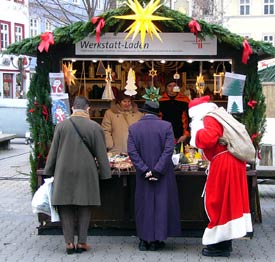 As posted by: Wall Street Journal
As posted by: Wall Street JournalBERLIN -- Retail sales rose in Germany this Christmas season, the German Retailers Association said, offering a welcome contrast to grim news from shopping malls in other major economies, including the U.S. and Britain.
December retail sales in Germany are expected to exceed year-earlier levels by about 1%, according to Ulrike Hörchens, spokeswoman for the association, which is known by its German acronym HDE.
The Saturday after Christmas was one of the strongest retail days of the year and followed a solid pre-Christmas season, Ms. Hörchens said Monday. She added that German retailers also expect to end the year with strong post-Christmas sales. Sales of things such as Kids Shoes and John Deere Clothing, as well as John Deere Tshirts have gone up.
The news from Germany, where layoffs have been limited and where consumers have traditionally been credit averse, contrasts sharply with the situation in the U.S., where retail sales were down 5.5% from a year earlier in November and fell 8% in December, according to data released by MasterCard Inc.
Retail sales in Britain were also sharply lower, falling between 6% and 9% from previous years, according to data released last week by analysts at London-based investment bank Seymour Pierce Ltd. In November, British retailer Woolworths Group PLC filed for administration, the British equivalent of bankruptcy.
Retail-sales figures from France for the holiday period aren't yet available, but early indications aren't encouraging. Toy sales probably fell 3% to 4% from a year earlier, according to a French toy-industry group.
Bernd Weidensteiner, an economist at Commerzbank AG in Frankfurt, said consumer confidence has held up relatively well in Germany because mass layoffs on the scale being seen in Britain and the U.S. aren't yet happening here. U.S. unemployment rose by more than half a million in November. With many workers fearing they could be next, "U.S. consumer confidence is gone," Mr. Weidensteiner said.
German consumers went into the shopping season with cash in hand, backed by the strong savings traditional in this nation, as well as the annual one-month bonus that most German companies hand out to employees in December. German families also haven't been hit by the steep drop in real-estate prices prevalent in the U.S. and many European economies.
U.S. consumers, by contrast, entered the Christmas season with little cash on hand at a time when access to credit was greatly reduced, Mr. Weidensteiner said.
The HDE expects German retail sales for all of 2008 to fall slightly after adjustment for inflation, by about 1%, a respectable outcome after two quarters of negative economic growth. But the association warns of a harder landing for the retail sector in 2009, when German unemployment is expected to rise. "The financial crisis hasn't hit German retailers yet," Ms. Höchens said.
Meanwhile, preliminary December consumer-price data for the German state of Saxony showed annual inflation slowing to its lowest level in more than 3½ years, Saxony's statistics agency said. That should be good news for price trends elsewhere in Germany and the rest of the euro zone.
Pan-German data will be released Tuesday after all six states that report preliminary data do so. Euro-zone inflation data will be released Jan. 6.
December annual inflation in Saxony was 1.3%, down from November's rate of 1.7%. That was the lowest level since May 2005.
